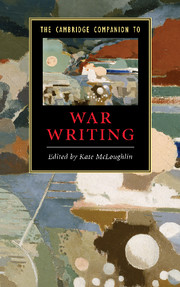Book contents
- Frontmatter
- Introduction
- Part I Themes
- Part II Influences
- Part III Poetics
- 8 Medieval warfare
- 9 Early modern war writing and the British Civil Wars
- 10 The eighteenth century and the romantics on war
- 11 American Revolutionary War writing
- 12 The Victorians and war
- 13 The American Civil War
- 14 The First World War: British writing
- 15 The First World War: American writing
- 16 The Spanish Civil War
- 17 The Second World War: British writing
- 18 The Second World War: American writing
- 19 American writing of the wars in Korea and Vietnam
- 20 The Cold War and the “war on terror”
- Index
16 - The Spanish Civil War
from Part III - Poetics
Published online by Cambridge University Press: 28 January 2010
- Frontmatter
- Introduction
- Part I Themes
- Part II Influences
- Part III Poetics
- 8 Medieval warfare
- 9 Early modern war writing and the British Civil Wars
- 10 The eighteenth century and the romantics on war
- 11 American Revolutionary War writing
- 12 The Victorians and war
- 13 The American Civil War
- 14 The First World War: British writing
- 15 The First World War: American writing
- 16 The Spanish Civil War
- 17 The Second World War: British writing
- 18 The Second World War: American writing
- 19 American writing of the wars in Korea and Vietnam
- 20 The Cold War and the “war on terror”
- Index
Summary
All wars capture the imagination, get aestheticized, inspire literature. But none more so than the Spanish Civil War (July 18, 1936 to April 1, 1939). This short-lived conflict was almost instantly read, across the globe from Santiago de Chile to Moscow, as the ultimate battleground for democracy, freedom, modernity, and art against reaction, oppression, censorship, old power, and repressive (especially religious, Roman Catholic) tradition. Spain was the apogee of what W. H. Auden, England's foremost young poet, had labeled “this hour of crisis and dismay.” Spain was, as Auden put it in “Spain,” the most famous English poem to appear about the war, where “the menacing shapes of our fever / Are precise and alive.”
Worldwide fascism was the essence of the “crisis.” The Left had long been preaching the need for writers to take up history's challenge, commit their whole being - time, energy, bodies, as well as their art - to resisting fascism by “going over” wholeheartedly to the side of “the people.” The military rising of General Franco against Spain's republican government, amply assisted by his Italian and German allies, brought that demand to a head. If the Right wasn't stopped in Spain, where would fascism's push end? Very many intellectuals, writers and other artists responded to the challenge.
Of course the Spanish Civil War was not the Poets' War it was sometimes billed as. Most of its participants - including the majority of the 40,000- 60,000 international volunteers, most of whom were with the communist organized International Brigades - were not intellectuals or writers or artists. But the war certainly involved - and divided - the literary and cultural worlds as no war before it.
- Type
- Chapter
- Information
- The Cambridge Companion to War Writing , pp. 185 - 196Publisher: Cambridge University PressPrint publication year: 2009

